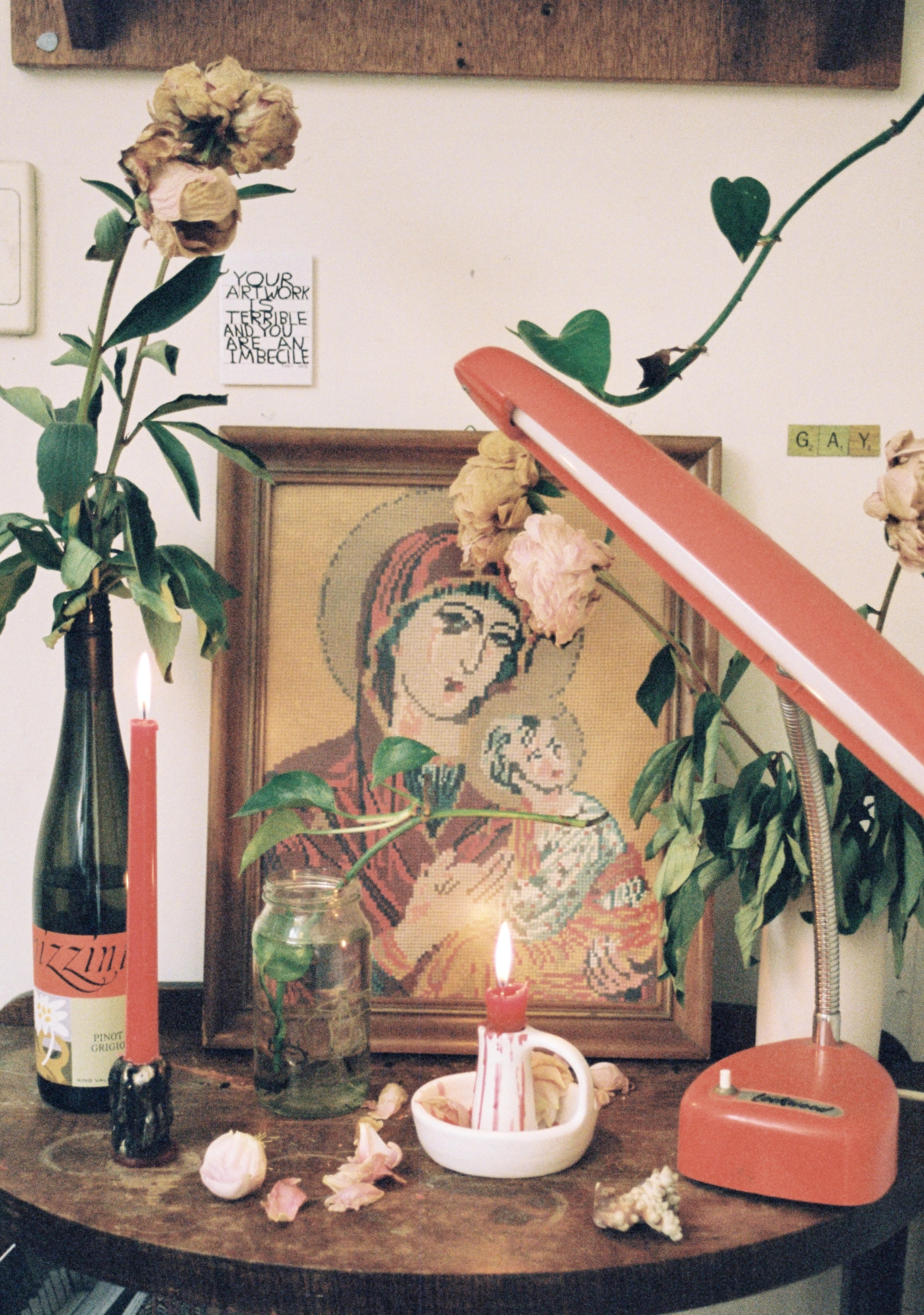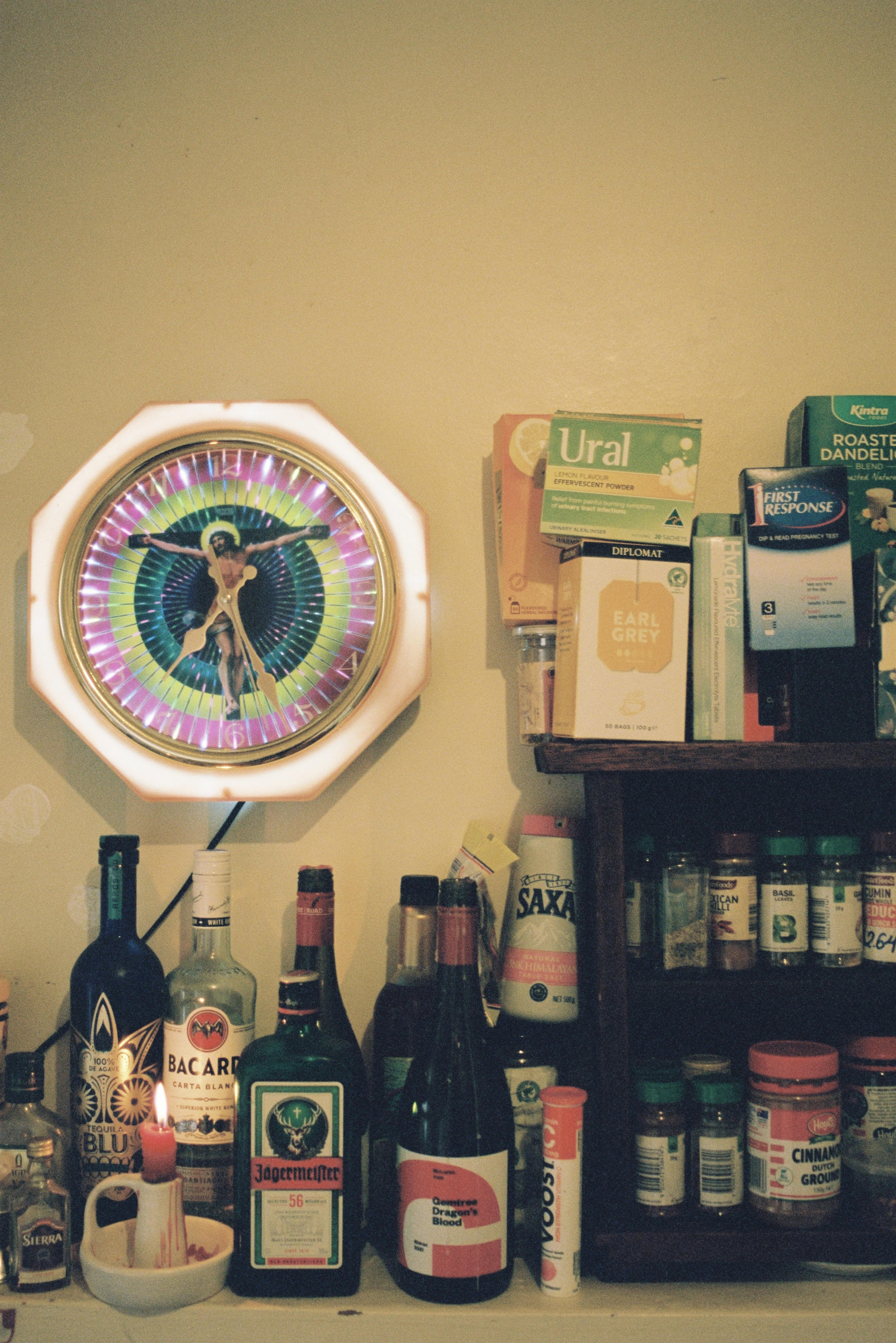JESUS HAS NO IDEA WHAT TIME IT IS
Viv Baker
What should young people do with their lives today? Many things, obviously. But the most daring thing is to create stable communities in which the terrible disease of loneliness can be cured.Kurt Vonnegut
While they were eating, Jesus took some bread, and after a blessing, He broke it and gave it to the disciples, and said, ‘Take, eat; this is My body’.Matthew 26:26
Windows as reverse mouths, gaping outward. Letting the world in. Bread broken over the bodies of lambs, mouthfuls of grape-tasting blood. Biting the hand that feeds. Climbing the walls to stop the walls from climbing you. Saying grace into a cloud of smoke, little fires in every room. Candles. Plates. Surfaces always slightly wet. More time than we know what to do with, much less deserve. How do you share joy so that everybody gets a slice? How do we love when God isn’t watching?
 Photo by Isabella Ford, 2021
Photo by Isabella Ford, 2021The English-speaking world has never been so secular. That’s not to say we’ve shed the Judeo-Christian values that shape Western morality, it’s just that most people engage with them only passively. Morality may no longer be evangelical, but its aftertaste is. These days we do not live to serve communities, and communities do not live to serve a higher power, yet the values of family, marriage, birth, love and death are still played to the tune of a hymn. Modernity, murky and vague yet palpably felt, has created a society that exists at a bizarre intersection. Its focus lies heavily on individual freedom, yet every individual has unprecedented access to the world around them; more access and information than anybody knows what to do with. We are simultaneously more self-absorbed and more interconnected than any of our ancestors.
‘Morality may no longer be evangelical, but its aftertaste is.’
It’s easy to classify a society predicated upon individualism as inherently narcissistic. I would argue, however, that an individualised world requires a certain absence of self-absorption; an acknowledgement that everybody around you is living for themselves just as you are.
The same keys on our belt loops make the same sound. Outside is a monstrous beast at the door, solid and sharp but gaseous too, thick and slow like honey pooling on the hardwood floor in the gap under the front door. Communion is cheap. Sometimes it’s stolen. Sometimes we dumpster dive for it. Communion is $8.50 from the 7/11 on the corner. Communion is watching your neighbour as they glow under a streetlight, hearing the same sirens, feeling the same cold snaps whip through the same city, fearing and falling in and out of love with almost the same world. Crying at the same time when the sun comes out again. Letting the outside couch get mouldy in the summer rain.

Photo by Isabella Ford, 2021
The concept of community may not have dissolved entirely as society secularised, but nothing has come close to filling the role of the church – particularly in the lives of young people. The Australian Census reveals a decades-long decline in young people identifying with religion. 2016 brought an all-time low: 39 per cent of Australians aged 18-34 reported they did not affiliate with any religious group. But if the young folk aren’t going to church, where are they going? The mall? Omegle? Underground raves?
‘But if the young folk aren’t going to church, where are they going? The mall? Omegle? Underground raves?’
Loneliness may be more pervasive than ever before. It wears many faces, goes by many names and has never attracted so many self-proclaimed ‘cures’. The pathologising of loneliness has spawned a lucrative empire: snake oil salesmen are propped up on every corner, hawking the cure for being alive. They're promising distraction, they're promising healing. They're promising connection.
Kurt Vonnegut called loneliness a 'terrible disease' and prescribed 'building community' as the cure. We as a species crave communion, faith-based or otherwise. As young people become increasingly estranged from institutions (church, marriage, military) they are met with expansive freedom, but also the malaise that comes with living for yourself and yourself alone. It leaves many young people, or at the very least it leaves me, faced with a pounding question that threatens to erupt in a scream –
What are we to do with all this time?
And then: I am running out of time. I am running out of choices. I am failing to outrun everything.
‘[S]nake oil salesmen are propped up on every corner, hawking the cure for being alive’.
In this void of new-age displacement, shared living is the solace. It offers community, even chosen family. For the young and the lost, sharehouses become a lesson in life-building; they are sanctuaries that offer the potential for spirituality removed from the rigidity of faith. They are godless communion.
Right now I'm living in my first sharehouse in my first new city, and it's full of religious iconography. In the kitchen, there’s a light-up Jesus clock that hasn’t told the time in years. When it's plugged in, flashing neon creaks to life and illuminates a faded picture of the crucifixion: it’s Jesus at his most camp. There's a string of rosary beads above the door and a Virgin Mary cross-stitch in the bathroom; the aesthetics of Catholicism are shamelessly exploited in every room. The angels watch us break bread without praying.
‘The angels watch us break bread without praying.’
No one knows how long it's been a sharehouse. Decades, at least. The history is in the walls, the flaking paint and the ancient spice rack; the air crackles with it. ‘It’s amazing’, said one of my housemates the other day, ‘that so many people have come through this building, and it doesn’t feel haunted or spooky’. Nobody has managed to curse this place. I can only guess whether anyone has tried. The house is a living, pulsing creature. When you consider the bigness of life, the time you spend in it is brief, but it's special and quietly sacred in a way that I suspect you don't fully recognise until you’ve left. You join the microbiome, growing around and beyond the steely edges of life just beginning, and when you feel your head begin to brush the ceiling you move on.
I guess the question is whether you can truly find the fulfilment of communion, of sharing and being seen, without the personal sacrifice we associate with organised religion. Is there such thing as a perfect union between independence and community?
‘Is there such thing as a perfect union between independence and community?’
Anyone who has lived with other people knows you cannot share a space without some degree of compromise. You must bend to the people around you. A balance must be maintained for everyone to feel comfortable, a domestic symbiosis. It’s not just about dirty plates, it’s about the atmosphere: the sense that you are supporting and being supported. This is not organised religion: you can exercise agency without fear of punishment. But you cannot be an island.
And you keep living. Moving with, not against. A quick prayer to the dust on the skirting boards. Open windows and lights left on and forgotten bills under the door. The clock ticks the wrong time and it’s a blessing in disguise - you’re never as late as you think you are. Days and nights bend and bleed and when pain comes in from the cold, bundled up in the hallway wearing your favourite coat, you ignore the twist in your gut and invite her inside. You hear the walls whistle through their teeth. Pain makes herself at home in your pantry, next to a tin of chickpeas and a jar of salt. The house itself, and the people inside, step over and around her as she floats from room to room, leaving dishes in the sink and wet clothes on the bathroom floor. She wants to catch you alone, but there’s always movement and distraction: soup on the stove and a song coming from the garden. And Pain is easily bored, she passes through by the time the trees get their leaves back. The walls exhale and the air softens. You sweep under the washing machine and leave flowers on the porch. You begin a list of all the ways to say ‘thank you’.

Photo by Isabella Ford, 2021
My sharehouse offered community, and I realised quickly it was up to me to choose whether I wanted to be a part of it. My hand was never forced, no part of me had to be left at the door. Sin and respect exist at once. Most days I wear polyester, pick up grapes off the kitchen floor, cut my own hair, cross-dress, and kiss my girlfriend, while Jesus smiles from the kitchen. When I scowl and ask Him to tell me the time, He tells me to cut the tone. His eyes shine as He flashes bright green. He looks happier than I’ve ever seen Him.